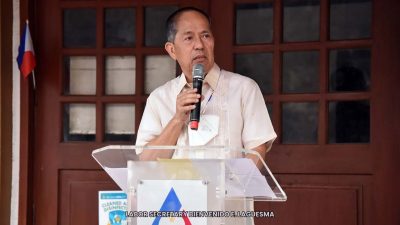MANILA — In a promising development for Filipino professionals, a substitute bill aimed at extending the validity of the Professional Regulation Commission (PRC) license ID from three years to five years is poised for smooth sailing and full support among members of the House of Representatives and the Senate.
This bill, deemed non-controversial, carries significant implications for the lives of countless professionals and their families across the nation.
The proposed extension, set to directly benefit approximately one million professionals who register and renew with the PRC annually, aligns seamlessly with the principles of the Ease of Doing Business and Anti-Red Tape Law.
By streamlining the renewal process and reducing administrative burdens, this move promises to enhance efficiency and convenience for professionals while fostering a more conducive environment for economic growth.
Optimism surrounds the timeline for Senate approval, with hopes pinned on a favorable outcome by May of this year. However, the pace of progress hinges on the Senate’s agenda and workload, given the limited number of session days ahead.
Close coordination with key figures such as Senate majority leader Sen. Joel Villanueva and Senator Ramon Revilla Jr., who serves as the counterpart in the Senate, will be instrumental in navigating the legislative landscape.
In tandem with efforts to extend the validity of PRC license IDs, attention remains focused on advancing legislative reforms to modernize outdated professional board laws.
With some laws dating back over three decades, the imperative for updates and upgrades is clear, underscoring the ongoing commitment to ensuring the relevance and effectiveness of regulatory frameworks in the 21st century.
Against the backdrop of evolving cybersecurity threats, a call to action resonates for bolstering the resilience of PRC and Civil Service Commission (CSC) internet portals and databases against hackers and cybercriminals.
Emphasizing the need for secure electronic interfaces with key national databases, including the PhilSys National ID, SSS, GSIS, PAG-IBIG, BIR, and PhilHealth, underscores a proactive stance in safeguarding sensitive information and critical infrastructure.
Looking ahead, a strategic focus on expanding the pool of certified cybersecurity professionals emerges as a priority. With only a limited number of certified experts currently in the country, urgent steps are warranted to scale up training and certification programs, thereby fortifying defenses against cyber threats and bolstering national cybersecurity resilience.
Harnessing the latest technologies and platforms, both for examination administration and professional development, stands as a cornerstone of enhancing the efficacy and relevance of PRC and CSC operations.
From online seminars to real-time monitoring of professional practices, leveraging technological advancements holds the key to driving meaningful progress and ensuring the continued competence and integrity of Filipino professionals and civil servants alike.
(el Amigo/MNM)







